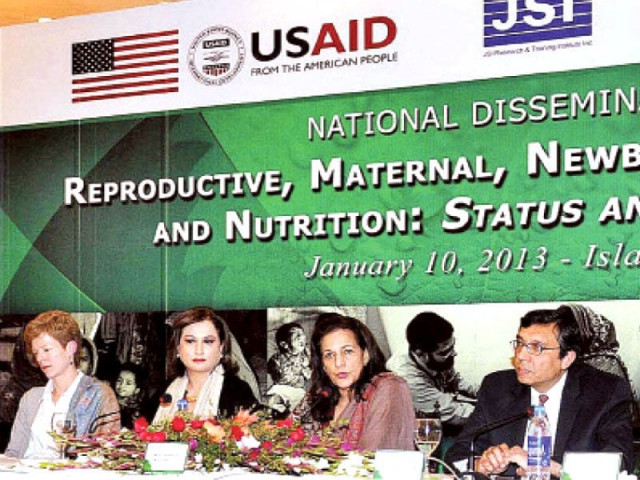Health woes: Call to make maternal, child health, nutrition national priority
Experts suggest addressing social determinants of health and empowering women.

PM Special Assistant Shahnaz Wazir Ali speaks at a national dissemination on reproductive, maternal, newborn, child health and nutrition in Islamabad on Thursday. PHOTO: APP
Health experts, politicians and donors unanimously expressed their resolve to make maternal, newborn, child health and nutrition a national priority agenda, asking political parties to include these in their election manifestos.
They unanimously agreed to this at the final session of a series of information dissemination on reproductive, maternal, newborn and child health and nutrition held at a local hotel on Thursday.
The participants said without addressing social determinants of health and women empowerment it was difficult to achieve health indicators for mothers and children.
Dr Zulfiqar Bhutta, Chair, Women and Child Health Division, the Aga Khan University’s (AKU), Karachi said around 45% of maternal deaths and 35% of newborn deaths take place at the time of delivery in the country. The major cause of maternal deaths is haemorrhage, but no concrete efforts have been made to address the issue.
Dr Bhutta said there was considerable variation across provinces and tribal areas in resources, access to services and development.

He recommended six packages of care covering pre-conceptual and post-abortion care, antenatal care, childbirth and immediate newborn care, postnatal care, expanded nutrition package, and expanded immunisation package including strengthening the routine immunisation systems.
Pakistan’s population is projected to reach 200 million by 2020, but no government took serious measures to control it, he stated. “The contraceptive prevalence rate has stagnated at 30%.”
Dr Farid Midhet of the College of Medicine, Qassim University, Saudi Arabia, recommended aggressive family planning to control the population growth, increased emphasis on primary healthcare services and complete integration of family planning in to health.

Prime Minister’s Special Assistant Shahnaz Wazir Ali said Political will was lacking to tackle the crisis. Health experts should form an alliance to write reports on health issues and send it to all political parties.
She admitted that the government had failed to meet its obligation to provide education to each and every child and provide basic health facilities.
She announced that a draft for mother-child health as a fundamental right has been formulated and will be discussed with stakeholders.
Dr Shehla Zaidi, assistant professor at AKU, pointed out that under-nutrition was a recognised health problem and played a substantial role in the country’s elevated maternal, and child morbidity and mortality.
The seminars were organised by AKU Division of Women and Child Health with the support of United States Agency for International Development.
Published in The Express Tribune, January 11th, 2013.



















COMMENTS
Comments are moderated and generally will be posted if they are on-topic and not abusive.
For more information, please see our Comments FAQ